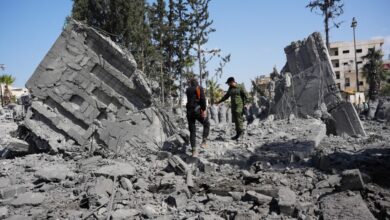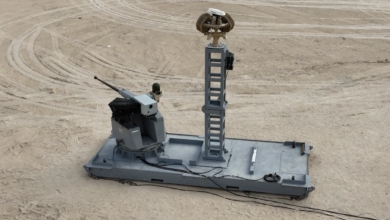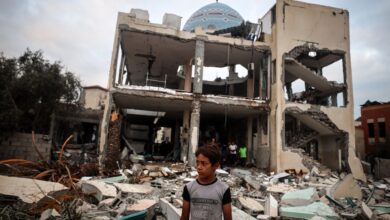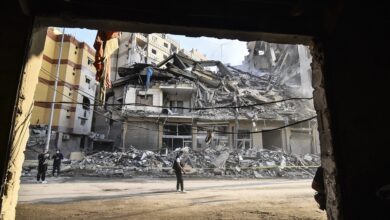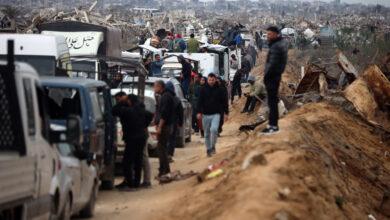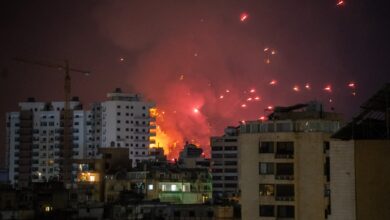Israel’s Strike on Iran: Limited Hit, Major Message
Israel’s apparent strike on Iran was deliberately limited in scope but sent a clear warning to the country’s leadership about Israeli abilities to strike at sensitive targets.
Tehran refuses to recognize Israel, and for decades the two countries have waged a shadow war marked by covert Israeli operations inside Iran and Iranian backing for anti-Israel militant groups, including Hamas in Gaza and Hezbollah in Lebanon.
But while the surge in tensions over the past weeks has calmed for now, the shadow war has entered a new phase, carrying more than ever the risk of open conflict between the foes, analysts say.
The current escalation comes against the background of Hamas’ October 7 attack on Israel followed by the Israeli bombing campaign in the Gaza Strip.
It began when Israel was blamed for carrying out an air strike on April 1 against Iran’s consulate in Damascus, killing seven Iranian officials from the Revolutionary Guards.
Iran responded with its first-ever direct attack on Israel, involving hundreds of drones and missiles, though almost all were shot down by Israel and its allies.
Amid fears of a major Israeli retaliation to that attack, which could itself provoke another Iranian response, Israel instead chose a much more limited option in the face of US pressure.
‘Remind Iran’
According to The New York Times, which cited Israeli and Iranian sources, the target was the radar system of a Russian-supplied S-300 missile defense system at an airbase in the central province of Isfahan, the region that hosts the Natanz uranium enrichment plant.
The origin of the strike is not entirely clear, but it included at least one missile fired from a warplane outside Iran and small attack drones known as quadcopters that could have been launched from inside Iran itself and were aimed at confusing air defenses, the reports said.
Israel, in line with its usual policy, has not confirmed or denied carrying out the strike on Iran or the April 1 attack in Syria.
“The purpose of the operation was precisely to remind Iran what Israel could be capable of,” said Arash Azizi, senior lecturer at Clemson University in the United States.
“The choice of the airbase near Isfahan was significant because this is the main source of air defence support for all the nuclear installations in the province,” he told AFP.
Israel is long believed to have carried out sabotage operations inside Iran through its Mossad espionage agency.
Most famously, according to US media reports, Iran’s top nuclear scientist Mohsen Fakhrizadeh was assassinated in 2020 by Mossad using a machine gun that had been assembled close to his home by its agents and then fired remotely after they left.
According to some outlets, including television channel Iran International, Israeli agents have even captured and interrogated Revolutionary Guards inside Iran to obtain intelligence.
There have also been suspicions, after mysterious explosions around sensitive sites, that Israel has already carried out drone attacks inside Iran, but this has never been confirmed.
‘Rubicon Crossed’
Iranian officials have been at pains to almost laugh off the Israeli strike, with Foreign Minister Hossein Amir-Abdollahian telling NBC News the weapons used were at the “level of toys.”
Iran’s supreme leader Ayatollah Ali Khamenei, meanwhile, praised the country’s armed forces for their “success.”
But Alexander Grinberg, an expert on Iran at the Jerusalem Institute for Strategy and Security, said Israel’s choice and designation of target was in itself indicative of the presence Mossad has inside Iran.
“Israel’s message is ‘We can strike anywhere in Iran’ given that Isfahan is in the centre of Iran, relatively far away, and Israel knows exactly where it can strike,” he said.
Grinberg said it was logical that Iran has not confirmed that the air base was hit: “From the moment you recognise the true scale of damage, you admit the power of the enemy.”
Holly Dagres, a non-resident senior fellow with the Atlantic Council, said if Israel’s attack involved small quadcopters, “these small drones were likely launched from inside Iran.”
This would highlight “yet another instance in which Mossad has a presence on the ground and how Iran is its playground,” she said.
While the current escalation phase appears to be over, Israel could yet launch more retaliation against Iran, and tensions may also surge again if Israel launches its long-threatened offensive on Rafah in Gaza.
“In some ways, we are now back to the pre-April 1 rules of operation: the realm of grey area and unattributable operations, sabotage,” said lecturer Azizi.
“That suits both Iran and Israel well. But the rubicon crossed on April 1 still matters and makes the stakes higher,” he added.



